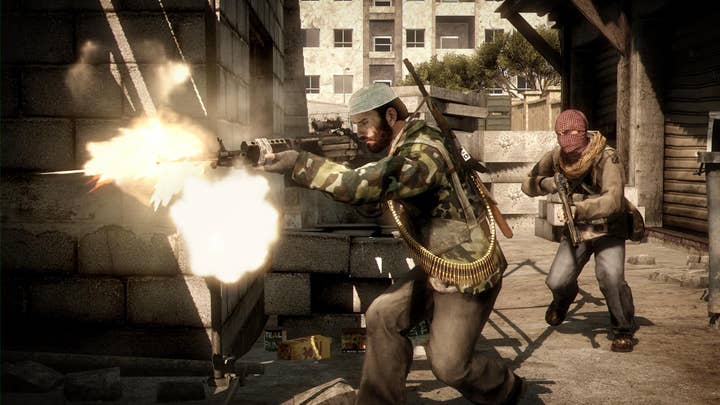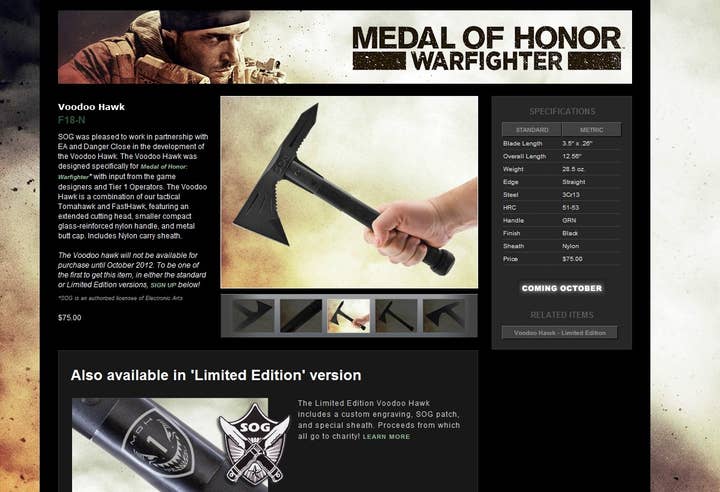PR danger closer than it may appear | 10 Years Ago This Month
EA's Medal of Honor studio honors the troops by letting people play as the Taliban amidst a good month for bad calls
The games industry moves pretty fast, and there's a tendency for all involved to look constantly to what's next without so much worrying about what came before. That said, even an industry so entrenched in the now can learn from its past. So to refresh our collective memory and perhaps offer some perspective on our field's history, GamesIndustry.biz runs this monthly feature highlighting happenings in gaming from exactly a decade ago.
Tier 1 Irritator
A decade ago, Electronic Arts gave its LA studio working on the Medal of Honor series a new name: Danger Close.
Executive producer Greg Goodrich explained the thinking behind the new name, saying, "When a [soldier] is calling in for danger close fire, it's the decision to take a chance, rather than sit back and call in from afar. For our team, 'danger close' is about pushing the boundaries and taking chances on telling a story we felt needed to be told."
The game did take chances, most notably with setting their game in the actual country of Afghanistan in the middle of an actual ongoing war. And while the “story we felt needed to be told” was mostly just another AAA first-person shooter campaign focused on Tier 1 Operators in the war, that real-world setting led to a much riskier chance in multiplayer: Having one side of players play as the Taliban.
In August, Fox News caught wind of that decision and had the mother of a soldier killed in Afghanistan on the air to talk about how disrespectful she thought the move was.
"We've just come off of the worst month of casualties in the whole war, and this game is going to be released in October - so families who are burying their children are going to be seeing this, and playing this game," the mother told the cable news channel.
EA's official response was the equivalent of a shrug.
"If someone's the cop, someone's gotta be the robber... In Medal of Honor multiplayer, someone's gotta be the Taliban"
Greg Goodrich
"We give gamers the opportunity to play both sides,” the company said. “Most of us having (sic) been doing this since we were seven - if someone's the cop, someone's gotta be the robber, someone's gotta be the pirate and someone's gotta be the alien. In Medal of Honor multiplayer, someone's gotta be the Taliban."
EA CEO John Riccitiello repeated that shrug to investors, saying no one complained "until a journalist decided to put the game box in front of a mom who'd lost her son in Afghanistan to create some controversy,” adding, "I think that says more about the newspapers than it does the game industry.”
At the risk of defending Fox News, it might say that the entire point of newspapers is to inform people about things they might care about but don't yet know. And I would suggest it says a whole lot about the games industry's ability to identify a scenario that speaks to weighty real-world concerns and actual tragedies requiring deft and deliberate decisions to navigate properly, and then to just go charging into it like an over-caffeinated clown in a potato sack race.
EA continued to hold its position despite ongoing criticism until about two weeks before the game's October launch, when it announced that the Taliban would be renamed “Opposing Force” in the multiplayer portion of the game.

In the statement announcing the change, Goodrich did not apologize or acknowledge that a mistake of any kind had been made. However, he did go out of his way to reassure gamers that their fun would not be spoiled just because some Gold Star families thought turning the ongoing war in which their loved ones died into a super happy fragfest fun time was inappropriate.
“While this change should not directly affect gamers, as it does not fundamentally alter the gameplay, we are making this change for the men and women serving in the military and for the families of those who have paid the ultimate sacrifice,” Goodrich said. “This franchise will never willfully disrespect, intentionally or otherwise, your memory and service.”
And just in case you were worried EA or Danger Close had reflected on the complaints and learned something, EA dismissed criticism of its actions even after making the change, chalking up the controversy to “an older generation that doesn't understand games.”
Danger Close would draw headlines for questionable decisions again with its 2012 follow-up, Medal of Honor: Warfighter. The studio put a big emphasis on authenticity as a selling point for that game, going so far as to publish a series of articles from Goodrich on the game's official website talking about how great the real-world weapons featured in it were and linking players to the manufacturer websites where they could be purchased. It also took preorders for a Medal of Honor-branded tomahawk until that started getting press coverage.

The next year, EA dissolved Danger Close and folded some of its developers into DICE LA.
Misfortune Telling
This might ordinarily go in the Good Call, Bad Call section below, but I feel like there are mitigating factors, which we'll get to below.
In July of 2010, Wedbush Securities analyst Michael Pachter was overly optimistic about the games industry's next few years. This story is about how he had predicted 5% growth in NPD sales for 2010 but was downgrading that to flat after a soft first half of the year.
Pachter's second guess was also off, as 2010's US sales total would actually end up down 5%.
But 2011 would be better, he said, predicting sales up 13%, followed by gains of 8% and 6% in 2012 and 2013.
Instead, 2011 was down 8%, followed by a dreadful 22% dip in 2012 and a 2% slide in 2013.
Cumulatively, Pachter was expecting 2013 sales to end up about 30% higher than 2009's. Instead, they were about 33% lower.
Forecasting this industry is hard to do at the best of times, and a missed call in the near term here or there (like Pachter's long-standing belief that Nintendo would release a Wii HD any day now, which he'd already been predicting for two years) can completely upend whatever assumptions you're basing your longer-term predictions on. If Pachter had 2012 down as the second full year of sales from the Wii HD, he would likely be expecting a considerably larger contribution to the NPD figures than they received from the Wii in its sixth year on shelves with minimal software support.
Pachter did say that the 3DS would be the primary driver of growth over that four-year span, so maybe he was too bullish on the handheld or stereoscopic 3D gaming in general. He certainly wouldn't have been the only one.
And then there were the question marks about upcoming motion controllers like Kinect or PlayStation Move. There was a lot of noise at the time about emerging technology with the potential to drive huge growth for the industry in the same way the Wii or rhythm games did a few years earlier. Get any one of those calls wrong and the overall industry picture changes greatly over four years.
Combine all that with a sluggish rebound for the US economy from the global economic crisis and the growth of digital distribution -- which was not reflected in the NPD numbers for any part of that time span -- and there's an incredible amount of room for error.
Good Call, Bad Call
BAD CALL: Disney paid up to $763 million to acquire social gaming company Playdom, a move immediately criticized by Cowan & Company analyst Doug Creutz, who noted the price was roughly twice what EA paid to acquired Playfish eight months earlier, even though Playdom had a smaller active user base.
While EA would shut down Playfish just three years later, Disney didn't even give Playdom the dignity of a proper burial, with the division barely a footnote during massive layoffs at Disney Interactive in 2014 and 2016 as the company shifted away from internal game development in favor of external licensing. Some Playdom titles were sold off to RockYou to keep them running. The last Disney-owned Playdom product, Marvel: Avengers Alliance, had its shutdown announced just prior to the 2016 layoffs.
BAD CALL: Rhode Island Governor Donald Carcieri defended the decision to entice 38 Studios to move to Rhode Island from Massachusetts with $75 million in loan guarantees, saying, “We need to make a statement ... this gives us the ability to be a real player in the digital-media area."
38 Studios collapsed spectacularly in less than two years, leaving the state on the hook for more than $100 million in the principal and interest.
BAD CALL: Brendan McNamara of L.A. Noire developer Team Bondi provided a strong entry in one of the most enduring genres of gaming industry Bad Calls, saying, "There's no uncanny valley any more. What you see is what you get. We've come out the other side. It's a big step."
The game had impressive performance capture for the time, but it crossed the uncanny valley in the same way Homer jumped over Springfield Gorge.
BAD CALL: THQ was convinced that Nintendo had cracked its handheld piracy problem with the 3DS once and for all.
It had not.
GOOD CALL: Ubisoft predicting that next-gen consoles would arrive in two or three years. The Wii U launched in two years, while the Xbox One and PlayStation 4 arrived in three.
BAD CALL: Ubisoft predicting that 3D TVs would be in everyone's homes by 2013.
GOOD CALL: We don't normally dole out praise for developers hyping their next games, but at the end of this interview about Joe Danger, Hello Games' Sean Murray says that if the company can double size from its four-person team, "what we could do with eight people could be fucking amazing, basically."
As Geoff Keighley described it years later, No Man's Sky had a development team of eight people when Hello Games announced it at The Game Awards predecessor VGX in 2013.










